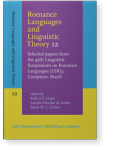Chapter 12
Epistemic uses of the verb decir in La Paz Spanish
Digamos and dice
This paper explores semantic extensions and pragmatic functions of two evidential forms found in La Paz Spanish, digamos ‘let’s say’ and dice ‘s/he says’. Both forms are inflected forms of the verb decir ‘to say’. The form dice ‘s/he says’ has the function of a reported evidential form, conforming to results from previous studies (Babel 2009; Olbertz 2007; Travis 2006; Laprade 1981), while the form digamos is used according to a previously unnoticed function of an inferential evidential.
Article outline
- Introduction
-
Evidentiality, modality and stance
- The evidential marker dizque in American Spanish
- Materials, participants and method
- The analysis of dice
- Functions of dice
- Syntactic placement, semantic scope and pragmatic implications of dice
- The analysis of digamos
- Functions of digamos
- Syntactic placement, semantic scope and pragmatic features of digamos
- Discussion
-
Notes
-
References
